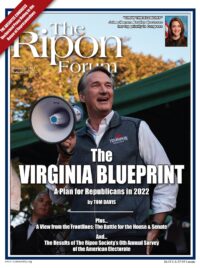
Following Glenn Youngkin’s victory for the governorship of Virginia, and the revelation that he had won voters of Latin origins, a wag online quipped that Youngkin had won the “Latino” vote, while his opponent Terry McAuliffe had won the “LatinX” vote.
It was probably not very funny to McAuliffe, but it contained an important political truth. The left wing of the Democratic Party has gotten out over its skis with its radical ideas and overall wokeness (of which the term “LatinX” is a prime example), and the voters known as Hispanics have begun to say, “Basta!”
This is unwelcome news to leftists, who for decades had operated on the unwavering assumption that the increasing number of people of Latin descent in America meant that the country would move leftward politically. This belief was, moreover, shared by some conservatives.
There was even a bestseller that told both sides that this was assured: The Emerging Democratic Majority. Written by political analysts Ruy Teixeira and John Judis, the 2002 book promised leftists that Latins would make the title a reality. “Hispanic support is a crucial part of a new Democratic majority,” they wrote.
The left wing of the Democratic Party has gotten out over its skis with its radical ideas and overall wokeness, and the voters known as Hispanics have begun to say, “Basta!”
Their publisher, Simon & Schuster, advertised the book saying, “Political experts John B. Judis and Ruy Teixeira convincingly use hard data — demographic, geographic, economic, and political — to forecast the dawn of a new progressive era.”
You can pick up a copy for $1.30 online at used–book retailer Alibris these days. Both Teixeira and Judis have recanted their views. Judis was first, in a high-profile, 2017 mea culpa in The Atlantic subtitled, “I argued that demographics favored the Democrats. I was wrong.”
Judis foresaw all this after Donald Trump defeated Hillary Clinton in 2016, and the 2020 election was, if anything, further evidence that the trend Judis foresaw was cementing itself: Voters of Latin origin are increasingly pulling the lever for the GOP.
Much ink is being spilled on why this is, especially by Politico, which has featured long essays on this subject. But little attention is paid to the main reason, which Judis to his credit discussed in his Atlantic article. The assumption of Democratic-leaning Latin voters relies on another assumption: that Americans of Latin descent regard themselves as people of color, and marginalized minorities at that, and that their descendants will as well.
“This isn’t a new argument, of course — and I bear some responsibility for it. The book I co-wrote in 2002 with demographer Ruy Teixeira, The Emerging Democratic Majority, laid out an overly optimistic forecast of the party’s prospects in an increasingly diverse America,” wrote Judis. At the time, Teixeira was still harboring hopes that a “majority-minority” country would hand the left power. Not Judis.
“On one level, there’s no arguing with the math. If you take the percentage of Americans that the U.S. census defines as ‘minorities’ and project their past voting habits into the next decade and beyond, you’ll come up with a very sunny version of the Democrats’ prospects,” wrote Judis, quickly adding, however, “There are only two problems with this line of thinking, but they’re pretty big ones.”
The Census Bureau’s prediction of a majority-minority country by the year 2044 was deeply flawed, continued Judis. I, too, have argued in an op-ed I wrote with Attorney General Ed Meese that majority-minority populations are a political decision arrived at through census manipulation, and can be fixed by ending such census legerdemain.
The 2020 election was, if anything, further evidence that voters of Latin origin are increasingly pulling the lever for the GOP.
Judis put the matter this way: “The U.S. census makes a critical assumption that undermines its predictions of a majority-nonwhite country. It projects that the same percentage of people who currently identify themselves as ‘Latino’ or ‘Asian’ will continue to claim those identities in future generations. In reality, that’s highly unlikely. History shows that as ethnic groups assimilate into American culture, they increasingly identify themselves as ‘white’. … In fact, it’s already happening. In the 2010 Census, 53 percent of Latinos identified as ‘white,’ as did more than half of Asian Americans of mixed parentage. In future generations, those percentages are almost certain to grow.”
My belief is that Judis, if anything, understates the point. It’s not that the passage of time in this country makes these Americans of Latin origin see themselves as white — it’s that many of them did not see themselves as people “of color” when they arrived. It’s only progressive strategy to inculcate in them a feeling of marginalization that has led to the creation of the “Hispanic” category in the Census to begin with. This is one of the central arguments of my 2020 book, The Plot to Change America.
This is what progressive organizer Ofelia Alonso pointed out in a November 2020 Politico article which said that in her opinion the “Latino” category was “an imprecise catchall term for members of an ethnic group in which people identify as Black, white, indigenous, Asian, Middle Eastern or mixed race.” Politico quoted her as saying, “A lot of people who voted for Trump, while they’re Latino, they’re also white.”
But that’s not the entire explanation. After the 2020 election, Teixeira threw in the towel — sort of. While Trump lost, he did very well in Texas’s Rio Grande Valley, the heartland of Tejano country. In these rural communities, the Mexican-American population, which comprises over 95 percent of the RGV, completely destroyed the “demography is destiny” argument. Several of the counties — Cameron, Starr, Willacy, Webb, and Hidalgo — all went over 40 percent for Donald Trump, who beat Joe Biden outright in Zapata County.
And just to add panic to the Democrats, The Wall Street Journal reported on December 8 that “the nation’s large and diverse group of Hispanic voters were now evenly split between GOP and the Democrats.”
“What happened?” asked Teixeira. Yes, part of it was the wrong racial assumption, but there was more. “Hispanics were lumped in with ‘people of color’ and were assumed to embrace the activism around racial issues that dominated so much of the political scene in 2020, particularly in the summer. This was a flawed assumption,” he wrote.
These voters, added Teixeira, are heavily oriented toward upward mobility, are patriotic, and are pro-law enforcement. The increasingly woke language and promises of progressive politicians clangs with their aspirations. Which brings us back to the Youngkin quip.
According to Politico, a poll in December 2021 by the Democratic Party polling firm Bendixen & Amandi International discovered that “only 2 percent of those polled refer to themselves as Latinx,” the new super-woke term the hard left insists on these days. “More problematic for Democrats: 40 percent said Latinx bothers or offends them to some degree and 30 percent said they would be less likely to support a politician or organization that uses the term.”
That is indeed bad news for a Biden administration that itself adopted this woke term.
Mike Gonzalez is a senior fellow at the Heritage Foundation’s Allison Center for Foreign Policy and the Angeles T. Arredondo E Pluribus Unum fellow.




